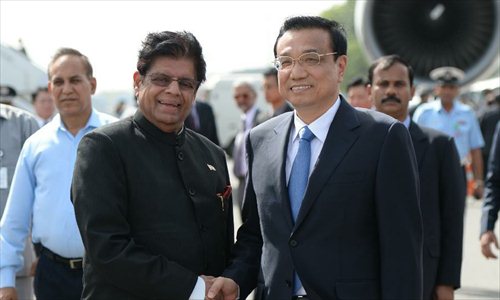
Chinese Premier Li Keqiang arrived in New Delhi on Sunday afternoon for the first leg of his maiden foreign trip since he became premier in March. Photo: Xinhua
Chinese Premier Li Keqiang flew to India Sunday for a three-day visit as the first stop of his maiden foreign trip, which is expected to include "financial diplomacy" to further boost bilateral trade.
Upon his arrival in New Delhi on Sunday, Li plans to hold talks with Indian Prime Minister Manmohan Singh, and will be the guest of honor at a dinner hosted by the Indian leader at his residence.
During his stay, Li will also meet with President Pranab Mukherjee and other leaders, sign a series of cooperation agreements, and deliver a speech on China-India ties.
Analysts said the choice of Li's trip destinations reflects that China values its relations with surrounding countries, especially India.
The visit came shortly after a three-week military standoff broke out along the two nations' border. The incident ended peacefully on May 7, after both countries withdrew troops from a disputed area in the western section of the Sino-Indian border.
"The border issue is an important topic but relations between China and India are based on broader themes such as two ancient civilizations and the global balance of power," Sabaree Mira, an international relations professor from Jawaharlal Nehru University, told the Global Times.
The Times of India predicts that China is taking a major shift toward financial diplomacy rather than seeking to win construction contracts and selling heavy equipment as before. It mentioned that a dozen financial executives were included in the business delegation, including seven from the China Development Bank and two from the Industrial and Commercial Bank of China.
Bilateral trade between China and India grew from $2.9 billion in 2000 to $61.7 billion in 2010, marking an increase of 20 times in 10 years. In 2012, the volume reached $66.5 billion.
"India is concerned with the trade imbalance, which comes mainly from differences in the two countries' economic structures," said Chinese Vice Minister of Commerce Jiang Yaoping on Thursday.
After visiting New Delhi, Li plans to travel to Mumbai on Tuesday to meet with business leaders and industry captains. He will then head to Pakistan where he will meet with Pakistan President Asif Ali Zardari, Prime Minister Mir Hazar Khan Khoso, and possibly Nawaz Sharif, Pakistan's former prime minister whose party won elections on May 11.
"Both India and Pakistan serve different yet important roles in China's diplomatic relations," said Sun Shihai, vice director of the Institute of Asia-Pacific Studies at the Chinese Academy of Social Sciences.
Sun told the Global Times that both countries possess nuclear weapons which naturally make them strategically vital to regional safety.
"India is a key player in maintaining the safety of maritime channels on the Indian Ocean, which is crucial to China's trade with the Middle East and Africa. Pakistan, on the other hand, can cast great influence on other Islamic countries like Afghanistan and serves as a bridge between China and the Middle East," said Sun.
Fu Xiaoqiang, an expert on South Asian Studies at the China Institutes of Contemporary International Relations, told the Global Times that China has mutual interests with both countries and has sought to promote development and facilitate peace in the region.
"China's development requires a stable neighboring environment. It is against China's fundamental interests to see conflicts break out between India and Pakistan," Fu added.
Agencies contributed to the story

Copyright ©1999-2011 Chinanews.com. All rights reserved.
Reproduction in whole or in part without permission is prohibited.